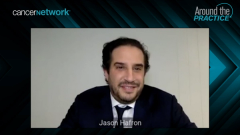
Polling Questions: Advanced Prostate Cancer
Raoul S. Concepcion, MD, FACS, poses polling questions for the audience’s medical specialty and the percent of patients they receive with prostate cancer.
Episodes in this series

Raoul S. Concepcion, MD, FACS: Welcome to Around the Practice. I’m Raoul Concepcion. I’m the chief science officer for US Urology Partners in Nashville, Tennessee. Tonight, we’re going to present a couple of cases on improving outcomes in advanced prostate cancer. I’m fortunate to be joined by 4 friends and colleagues who will introduce themselves, and then we’ll proceed right into the program.
Jason M. Hafron, MD, CMO: Good evening, everyone. I’m Dr Jason Hafron. I’m the chief medical officer at the Michigan Institute of Urology in West Bloomfield, Michigan. I also oversee our advanced prostate cancer clinic.
Daniel P. Petrylak, MD: I’m Dr Dan Petrylak. I’m a professor of medicine and urology at Yale School of Medicine in New Haven, Connecticut, and I’m head of the GU [genitourinary] DART, or disease-related research team.
Leonard G. Gomella, MD, FACS: I’m Dr Leonard Gomella from the Department of Urology at Thomas Jefferson University in the Sidney Kimmel Cancer Center in Philadelphia, Pennsylvania. I’m also the senior director for clinical affairs for the cancer center, and I oversee the Jefferson Health Urology Enterprise.
Raoul S. Concepcion, MD, FACS: The fourth panelist is Dr Oliver Sartor. He’s a professor of medical oncology at Tulane University School of Medicine in New Orleans, Louisiana, and a recognized expert in advanced prostate cancer. It’s always great to have all of you involved, and I’m looking forward to a great discussion.
This is for the audience. We’re trying to get a feel of the demographics of who’s tuning in tonight. Polling question No. 1: what is your specialty? A) general medical oncology, B) urologic oncology, C) urology, D) other. We have mostly urology coming in tonight, which is great. Hopefully we’ll have others voting shortly. Let’s go to polling question No. 2: approximately what percentage of your patients who you personally manage have a diagnosis of prostate cancer? Is that A) less than 10%, B) 11% to 20%, C) 21% to 30%, D) 31% to 40%, E) greater than 50%? Go ahead and enter that response, obviously depending upon what the actual mix is going to be. Clearly, we know that oftentimes community medical oncologists don’t have the higher percentage of patients with advanced prostate cancer relative to some of the urology practices and academic centers. We have 1 respondent who has greater than 50%, but for the people who are entering in, it’s less than 30% of the practice. We’ll keep tabulating that and make those available.
Transcript Edited for Clarity
Newsletter
Stay current with the latest urology news and practice-changing insights — sign up now for the essential updates every urologist needs.











